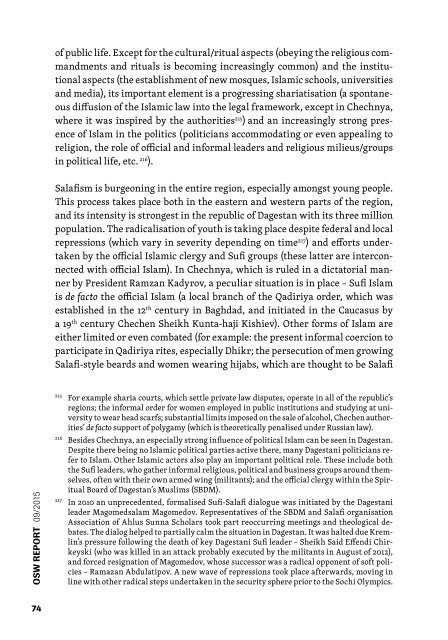HOMO JIHADICUS
homojihadicus
homojihadicus
Create successful ePaper yourself
Turn your PDF publications into a flip-book with our unique Google optimized e-Paper software.
of public life. Except for the cultural/ritual aspects (obeying the religious commandments<br />
and rituals is becoming increasingly common) and the institutional<br />
aspects (the establishment of new mosques, Islamic schools, universities<br />
and media), its important element is a progressing shariatisation (a spontaneous<br />
diffusion of the Islamic law into the legal framework, except in Chechnya,<br />
where it was inspired by the authorities 215 ) and an increasingly strong presence<br />
of Islam in the politics (politicians accommodating or even appealing to<br />
religion, the role of official and informal leaders and religious milieus/groups<br />
in political life, etc. 216 ).<br />
Salafism is burgeoning in the entire region, especially amongst young people.<br />
This process takes place both in the eastern and western parts of the region,<br />
and its intensity is strongest in the republic of Dagestan with its three million<br />
population. The radicalisation of youth is taking place despite federal and local<br />
repressions (which vary in severity depending on time 217 ) and efforts undertaken<br />
by the official Islamic clergy and Sufi groups (these latter are interconnected<br />
with official Islam). In Chechnya, which is ruled in a dictatorial manner<br />
by President Ramzan Kadyrov, a peculiar situation is in place – Sufi Islam<br />
is de facto the official Islam (a local branch of the Qadiriya order, which was<br />
established in the 12 th century in Baghdad, and initiated in the Caucasus by<br />
a 19 th century Chechen Sheikh Kunta-haji Kishiev). Other forms of Islam are<br />
either limited or even combated (for example: the present informal coercion to<br />
participate in Qadiriya rites, especially Dhikr; the persecution of men growing<br />
Salafi-style beards and women wearing hijabs, which are thought to be Salafi<br />
PRACE OSW REPORT OSW 09/2012 09/2015<br />
215<br />
For example sharia courts, which settle private law disputes, operate in all of the republic’s<br />
regions; the informal order for women employed in public institutions and studying at university<br />
to wear head scarfs; substantial limits imposed on the sale of alcohol, Chechen authorities’<br />
de facto support of polygamy (which is theoretically penalised under Russian law).<br />
216<br />
Besides Chechnya, an especially strong influence of political Islam can be seen in Dagestan.<br />
Despite there being no Islamic political parties active there, many Dagestani politicians refer<br />
to Islam. Other Islamic actors also play an important political role. These include both<br />
the Sufi leaders, who gather informal religious, political and business groups around themselves,<br />
often with their own armed wing (militants); and the official clergy within the Spiritual<br />
Board of Dagestan’s Muslims (SBDM).<br />
217<br />
In 2010 an unprecedented, formalised Sufi-Salafi dialogue was initiated by the Dagestani<br />
leader Magomedsalam Magomedov. Representatives of the SBDM and Salafi organisation<br />
Association of Ahlus Sunna Scholars took part reoccurring meetings and theological debates.<br />
The dialog helped to partially calm the situation in Dagestan. It was halted due Kremlin’s<br />
pressure following the death of key Dagestani Sufi leader – Sheikh Said Effendi Chirkeyski<br />
(who was killed in an attack probably executed by the militants in August of 2012),<br />
and forced resignation of Magomedov, whose successor was a radical opponent of soft policies<br />
– Ramazan Abdulatipov. A new wave of repressions took place afterwards, moving in<br />
line with other radical steps undertaken in the security sphere prior to the Sochi Olympics.<br />
74


